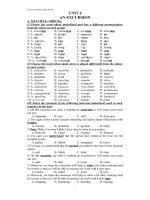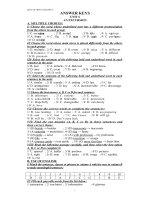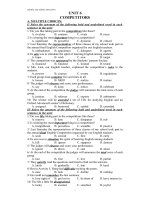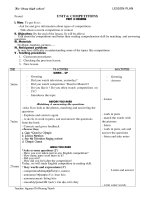Unit6 accessible
Bạn đang xem bản rút gọn của tài liệu. Xem và tải ngay bản đầy đủ của tài liệu tại đây (247.99 KB, 49 trang )
Applied Linguistics to Foreign Language Teaching and Learning
Unit 6: Views of Language Acquisition and Learning in Foreign Language Didactics
Bessie Dendrinos
School of Philosophy
Faculty of English Language and Literature
Main issues of this unit
•
The source of language learning theories.
•
Principles of Behaviourism.
•
Principles of Mentalism (Chomsky).
•
Principles of Cognitivism.
•
Principles of Constructivism.
•
Principles of Humanism.
•
Principles of Social Interactionism.
•
Comprehensible input and comprehensible output.
Views of Language Acquisition and Learning in Foreign Language Didactics
2
Scientific fields related to learning and language learning
(1/2)
•
Psychology: a diverse area of study which involves, amongst other things, the study of how
humans learn and how they make sense of the world.
•
Psycholinguistics: involves the study of a) the mental processes that a person uses in
producing and understanding language and b) how humans learn language (the study of
speech perception, the role of memory, concepts and other processes of language use).
Views of Language Acquisition and Learning in Foreign Language Didactics
3
Scientific fields related to learning and language learning
(2/2)
•
First language acquisition is an area of psycholinguistics which focuses on how children
learn their mother tongue.
•
Second language acquisition is an area of applied linguistics and studies the processes by
which people develop proficiency in a second or foreign language. These processes are
investigated with the expectation that this information may be of use to language teaching.
Views of Language Acquisition and Learning in Foreign Language Didactics
4
Behaviourism: Main Principles (1/3)
•
•
Main protagonists: Ivan Pavlov, John Watson, Edward Thorndike, B.F. Skinner.
•
Learning is changed behaviour.
Learning happens when a correct response is demonstrated following the
presentation of a specific environmental stimulus.
Views of Language Acquisition and Learning in Foreign Language Didactics
5
Behaviourism: Main Principles (2/3)
•
Conditioning: Learning is seen as a process of developing connections between a stimulus
and a response. This process is called conditioning.
•
Habit formation: An individual responds to a stimulus by behaving in a particular way. If the
behaviour is reinforced (i.e. rewards or punishment) then the likelihood of that behaviour
occurring on a subsequent occasion will be increased or decreased. As the behaviour is
reinforced, habits are formed.
Views of Language Acquisition and Learning in Foreign Language Didactics
6
Behaviourism: Main Principles (3/3)
•
Importance of environment: Learning is a result of environmental rather than
genetic factors. The child is born as a clean slate and the environment writes its
messages on this clean slate.
Views of Language Acquisition and Learning in Foreign Language Didactics
7
Behaviourism and foreign language teaching (1/4)
•
It had a powerful influence on second and foreign language teaching between the 1940s
and the 1970s.
•
Influenced the development of the audiolingual method.
•
Instruction is to elicit the desired response from the learner who is presented with a target
stimulus.
•
Student as passive receiver of information memorized dialogues and sentence patterns by
heart.
Views of Language Acquisition and Learning in Foreign Language Didactics
8
Behaviourism and foreign language teaching (2/4)
•
Based on rewards and punishments.
•
Responsibility for student learning rests squarely with the teacher.
•
Lecture-based, highly structured.
•
Primacy of speech: considers speech as primary partly because it is the first medium
that the child masters. Skills are taught in a specific order: Listening and speaking
then reading/writing.
Views of Language Acquisition and Learning in Foreign Language Didactics
9
Behaviourism and foreign language teaching (3/4)
•
Stimulus-response-reinforcement: Learners are taught the language in small, sequential steps
(structures and then sentence patterns). A small part of the language is presented as a stimulus, to
which the learner responds by repeating or by substituting. This is followed by reinforcement by the
teacher. By repeating the learner develops habits Learning a language is seen as acquiring a set of
appropriate mechanical habits and errors are frowned upon because they lead to the development
of “bad” habits. The role of the teacher is to develop in learners good language habits.
Views of Language Acquisition and Learning in Foreign Language Didactics
10
Behaviourism and foreign language teaching (4/4)
•
Inductive learning: Because learning is a question of habit formation rather than problem
solving, any type of explanation is consistently avoided. It is a last resort and always occurs
in the final stage, when the language item has been well practiced and the appropriate habit
acquired.
Views of Language Acquisition and Learning in Foreign Language Didactics
11
Mentalism and Chomsky (1/3)
•
Mentalism is the belief that the mind is important for determining human behaviour.
•
Chomsky argued that what was missing from the behaviourist concept of learning was a
theory of mind - a mentalist perspective, in other words. The mind was seen to possess a
set of deep-seated ways of processing language data that lead to the unconscious discovery
of the grammar of the language - learning as a rule-governed activity.
Views of Language Acquisition and Learning in Foreign Language Didactics
12
Mentalism and Chomsky (2/3)
•
He argued that behaviourists failed to recognise the logical problem of language
acquisition: children learn more about the language than they could reasonably
be expected to learn on the basis of the language samples they hear. They can
produce language that they have never heard of.
Views of Language Acquisition and Learning in Foreign Language Didactics
13
Mentalism and Chomsky (3/3)
•
Children’s minds are not blank slates to be filled in by imitating the language they hear from
the environment. Children are born with an innate capacity for language learning which
allows them to discover for themselves the rules underlying the language.
•
This innate ability is called language acquisition device (LAD) or black box; later on Chomsky
referred to this as innate knowledge of the principles of Universal Grammar (UG).
Views of Language Acquisition and Learning in Foreign Language Didactics
14
How does the language acquisition device work?
•
The language acquisition device contains all the principles which are universal to all
languages.
•
For language acquisition device to work the child needs samples of natural language which
activate the device.
•
Once activated, the child is able to discover the structure of the language by matching the
innate knowledge of grammatical principles with the structures of the particular language.
Language Acquisition Device = Universal Grammar
Views of Language Acquisition and Learning in Foreign Language Didactics
15
Cognitivism (1/2)
•
Cognitive psychology in contrast to behaviourism is interested in the way the human mind
thinks and learns. It is interested in the cognitive processes that are involved in learning and
how the learner is involved in the process of learning.
•
The learner is seen as an active participant in the learning process using various kind of
mental strategies in order to sort out the system of the language being learnt.
Views of Language Acquisition and Learning in Foreign Language Didactics
16
Cognitivism (2/2)
•
•
Cognitive theories look beyond behavior to explain brain-based learning.
Information processing model:
–
Learning happens as a result of brain processes where knowledge is transferred from short to long
term memory.
–
In order for this to happen, new information must be linked to old information and information and
concepts must be logically organised.
•
The role of the teacher is to help learners organize new information for later recall.
Views of Language Acquisition and Learning in Foreign Language Didactics
17
Cognitivism and implications for learning
•
Learning is an active process in which learners construct new ideas or concepts based upon
their current/past knowledge.
•
The learner selects and transforms information, constructs hypotheses, and makes
decisions, relying on a cognitive structure to do so.
•
Cognitive structure (i.e., schema, mental models) provides meaning and organization to
experiences and allows the individual to "go beyond the information given".
Views of Language Acquisition and Learning in Foreign Language Didactics
18
Cognitivism and implications for teaching (1/2)
•
As far as instruction is concerned, the instructor should try and encourage students to
discover principles by themselves.
•
The instructor and student should engage in an active dialog (i.e., Socratic learning).
•
The task of the instructor is to translate information to be learned into a format appropriate
to the learner's current state of understanding.
Views of Language Acquisition and Learning in Foreign Language Didactics
19
Cognitivism and implications for teaching (2/2)
•
Curriculum should be organized in a spiral manner so that the student
continually builds upon what they have already learned.
•
Inquiry-oriented projects.
•
Opportunities for the testing of hypotheses.
Views of Language Acquisition and Learning in Foreign Language Didactics
20
Constructivism (1/2)
•
Based on the work of Jean Piaget and Jerome Bruner, Lev Vygotsky.
•
Constructivism views learning as a process in which the learner actively
constructs or builds new ideas or concepts.
Views of Language Acquisition and Learning in Foreign Language Didactics
21
Constructivism (2/2)
We can distinguish between:
•
cognitive constructivism which is about how the individual learner understands
things, in terms of developmental stages and learning styles,
•
social constructivism, which emphasises how meanings and understandings
grow out of social encounters.
Views of Language Acquisition and Learning in Foreign Language Didactics
22
Cognitive Constructivism - Piaget
•
•
From the moment we are born we are actively involved in the process of learning.
•
Piaget believed that cognitive development occurs through a sequence of successive
qualitative changes in cognitive structures.
We learn things as a direct result of our experiences but we make sense of those
experiences at different stages of our lives.
Views of Language Acquisition and Learning in Foreign Language Didactics
23
Piaget’s Four Stages of Cognitive Development (1/2)
•
Sensorimotor Stage (birth - 2 years):
– actions become more intentional and integrated into patterns, there is an
increased awareness of self and surroundings.
•
Preoperational Thought Stage (2 - 7 years):
– development of language and conceptual thought occurs.
Views of Language Acquisition and Learning in Foreign Language Didactics
24
Piaget’s Four Stages of Cognitive Development (2/2)
•
Concrete Operations Stage (7 - 11 years):
– increased ability to apply logical thought to concrete problems, thinking is
still primarily related to immediate experience.
•
Formal Operations Stage (11 years on):
– ability to apply logic to a variety of problems; higher order thinking occurs.
Views of Language Acquisition and Learning in Foreign Language Didactics
25









